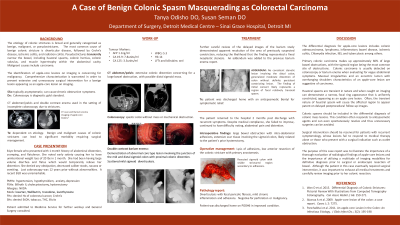General Surgery
A Case of Benign Colonic Spasm Masquerading as Colorectal Carcinoma

Has Audio
Introduction/Purpose:
Introduction: If not comprehensively characterized, etiologies presenting as apple core lesions on imaging can be mistaken for malignancy and thus, an extensive surgical approach may be untaken unnecessarily.
Methods or Case Description:
Case presentation: An 81-year-old female presented with significant weight loss over a month, abdominal pain, distension, diarrhea, and flatulence. CT abdomen was concerning for a large bowel obstruction, secondary to possible primary colon carcinoma, for which Surgery was consulted. A double contrast barium enema was completed which was originally interpreted as an abnormal core type lesion involving the sigmoid colon. Colonoscopy was subsequently completed showing spastic colon without mass or mechanical obstruction. Careful review of the original barium study demonstrated apparent resolution of the area of previously suspected constriction, reducing the likelihood of a fixed neoplastic stenosis. The patient was discharged home with an antispasmodic for symptomatic relief. She returned two months later with recurrent symptoms. Operative management was undertaken with low anterior resection of the colonic stricture. Pathology was reported as diverticulosis with focal pericolic fibrosis, negative for malignancy.
Outcomes:
Discussion: Colonic carcinoma is usually detected on colonoscopy or barium enema for evaluating vague abdominal symptoms. Haustral spasms are transient in nature and when caught on imaging can demonstrate a narrow, focal ring appearance that is uniformly constricted, appearing as an apple core lesion. Although acute attacks of diverticulitis can cause transient episodes of partial obstruction, recurrent inflammatory attacks can eventually lead to marked fibrosis of the colonic wall and stricture formation, causing partial or complete obstruction.
Conclusion:
Conclusion: Thorough evaluation of colonic obstruction utilizing a multitude of imaging modalities for definitive diagnosis prior to surgical resection of bowel is crucial to avoid unnecessary surgery and related complications.
Introduction: If not comprehensively characterized, etiologies presenting as apple core lesions on imaging can be mistaken for malignancy and thus, an extensive surgical approach may be untaken unnecessarily.
Methods or Case Description:
Case presentation: An 81-year-old female presented with significant weight loss over a month, abdominal pain, distension, diarrhea, and flatulence. CT abdomen was concerning for a large bowel obstruction, secondary to possible primary colon carcinoma, for which Surgery was consulted. A double contrast barium enema was completed which was originally interpreted as an abnormal core type lesion involving the sigmoid colon. Colonoscopy was subsequently completed showing spastic colon without mass or mechanical obstruction. Careful review of the original barium study demonstrated apparent resolution of the area of previously suspected constriction, reducing the likelihood of a fixed neoplastic stenosis. The patient was discharged home with an antispasmodic for symptomatic relief. She returned two months later with recurrent symptoms. Operative management was undertaken with low anterior resection of the colonic stricture. Pathology was reported as diverticulosis with focal pericolic fibrosis, negative for malignancy.
Outcomes:
Discussion: Colonic carcinoma is usually detected on colonoscopy or barium enema for evaluating vague abdominal symptoms. Haustral spasms are transient in nature and when caught on imaging can demonstrate a narrow, focal ring appearance that is uniformly constricted, appearing as an apple core lesion. Although acute attacks of diverticulitis can cause transient episodes of partial obstruction, recurrent inflammatory attacks can eventually lead to marked fibrosis of the colonic wall and stricture formation, causing partial or complete obstruction.
Conclusion:
Conclusion: Thorough evaluation of colonic obstruction utilizing a multitude of imaging modalities for definitive diagnosis prior to surgical resection of bowel is crucial to avoid unnecessary surgery and related complications.

Tanya Odisho, DO
General Surgery Resident Physician, PGY-2
DMC Sinai Grace Hospital
Farmington Hills, MI, US
